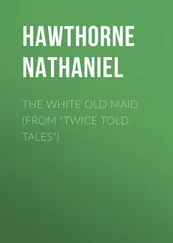One forenoon, during my convalescence, there came a gentle tap at my chamber door. I immediately said, “Come in, Priscilla!” with an acute sense of the applicant’s identity. Nor was I deceived. It was really Priscilla, — a pale, large-eyed little woman (for she had gone far enough into her teens to be, at least, on the outer limit of girlhood), but much less wan than at my previous view of her, and far better conditioned both as to health and spirits. As I first saw her, she had reminded me of plants that one sometimes observes doing their best to vegetate among the bricks of an enclosed court, where there is scanty soil and never any sunshine. At present, though with no approach to bloom, there were indications that the girl had human blood in her veins.
Priscilla came softly to my bedside, and held out an article of snow-white linen, very carefully and smoothly ironed. She did not seem bashful, nor anywise embarrassed. My weakly condition, I suppose, supplied a medium in which she could approach me.
“Do not you need this?” asked she. “I have made it for you.” It was a nightcap!
“My dear Priscilla,” said I, smiling, “I never had on a nightcap in my life! But perhaps it will be better for me to wear one, now that I am a miserable invalid. How admirably you have done it! No, no; I never can think of wearing such an exquisitely wrought nightcap as this, unless it be in the daytime, when I sit up to receive company.”
“It is for use, not beauty,” answered Priscilla. “I could have embroidered it and made it much prettier, if I pleased.”
While holding up the nightcap and admiring the fine needlework, I perceived that Priscilla had a sealed letter which she was waiting for me to take. It had arrived from the village post-office that morning. As I did not immediately offer to receive the letter, she drew it back, and held it against her bosom, with both hands clasped over it, in a way that had probably grown habitual to her. Now, on turning my eyes from the nightcap to Priscilla, it forcibly struck me that her air, though not her figure, and the expression of her face, but not its features, had a resemblance to what I had often seen in a friend of mine, one of the most gifted women of the age. I cannot describe it. The points easiest to convey to the reader were a certain curve of the shoulders and a partial closing of the eyes, which seemed to look more penetratingly into my own eyes, through the narrowed apertures, than if they had been open at full width. It was a singular anomaly of likeness coexisting with perfect dissimilitude.
“Will you give me the letter, Priscilla?” said I.
She started, put the letter into my hand, and quite lost the look that had drawn my notice.
“Priscilla,” I inquired, “did you ever see Miss Margaret Fuller?”
“No,” she answered.
“Because,” said I, “you reminded me of her just now, — and it happens, strangely enough, that this very letter is from her.”
Priscilla, for whatever reason, looked very much discomposed.
“I wish people would not fancy such odd things in me!” she said rather petulantly. “How could I possibly make myself resemble this lady merely by holding her letter in my hand?”
“Certainly, Priscilla, it would puzzle me to explain it,” I replied; “nor do I suppose that the letter had anything to do with it. It was just a coincidence, nothing more.”
She hastened out of the room, and this was the last that I saw of Priscilla until I ceased to be an invalid.
Being much alone during my recovery, I read interminably in Mr. Emerson’s Essays, “The Dial,” Carlyle’s works, George Sand’s romances (lent me by Zenobia), and other books which one or another of the brethren or sisterhood had brought with them. Agreeing in little else, most of these utterances were like the cry of some solitary sentinel, whose station was on the outposts of the advance guard of human progression; or sometimes the voice came sadly from among the shattered ruins of the past, but yet had a hopeful echo in the future. They were well adapted (better, at least, than any other intellectual products, the volatile essence of which had heretofore tinctured a printed page) to pilgrims like ourselves, whose present bivouac was considerably further into the waste of chaos than any mortal army of crusaders had ever marched before. Fourier’s works, also, in a series of horribly tedious volumes, attracted a good deal of my attention, from the analogy which I could not but recognize between his system and our own. There was far less resemblance, it is true, than the world chose to imagine, inasmuch as the two theories differed, as widely as the zenith from the nadir, in their main principles.
I talked about Fourier to Hollingsworth, and translated, for his benefit, some of the passages that chiefly impressed me.
“When, as a consequence of human improvement,” said I, “the globe shall arrive at its final perfection, the great ocean is to be converted into a particular kind of lemonade, such as was fashionable at Paris in Fourier’s time. He calls it limonade a cedre. It is positively a fact! Just imagine the city docks filled, every day, with a flood tide of this delectable beverage!”
“Why did not the Frenchman make punch of it at once?” asked Hollingsworth. “The jack-tars would be delighted to go down in ships and do business in such an element.”
I further proceeded to explain, as well as I modestly could, several points of Fourier’s system, illustrating them with here and there a page or two, and asking Hollingsworth’s opinion as to the expediency of introducing these beautiful peculiarities into our own practice.
“Let me hear no more of it!” cried he, in utter disgust. “I never will forgive this fellow! He has committed the unpardonable sin; for what more monstrous iniquity could the Devil himself contrive than to choose the selfish principle, — the principle of all human wrong, the very blackness of man’s heart, the portion of ourselves which we shudder at, and which it is the whole aim of spiritual discipline to eradicate, — to choose it as the master workman of his system? To seize upon and foster whatever vile, petty, sordid, filthy, bestial, and abominable corruptions have cankered into our nature, to be the efficient instruments of his infernal regeneration! And his consummated Paradise, as he pictures it, would be worthy of the agency which he counts upon for establishing it. The nauseous villain!”
“Nevertheless,” remarked I, “in consideration of the promised delights of his system, — so very proper, as they certainly are, to be appreciated by Fourier’s countrymen, — I cannot but wonder that universal France did not adopt his theory at a moment’s warning. But is there not something very characteristic of his nation in Fourier’s manner of putting forth his views? He makes no claim to inspiration. He has not persuaded himself — as Swedenborg did, and as any other than a Frenchman would, with a mission of like importance to communicate — that he speaks with authority from above. He promulgates his system, so far as I can perceive, entirely on his own responsibility. He has searched out and discovered the whole counsel of the Almighty in respect to mankind, past, present, and for exactly seventy thousand years to come, by the mere force and cunning of his individual intellect!”
“Take the book out of my sight,” said Hollingsworth with great virulence of expression, “or, I tell you fairly, I shall fling it in the fire! And as for Fourier, let him make a Paradise, if he can, of Gehenna, where, as I conscientiously believe, he is floundering at this moment!”
“And bellowing, I suppose,” said I, — not that I felt any ill-will towards Fourier, but merely wanted to give the finishing touch to Hollingsworth’s image, “bellowing for the least drop of his beloved limonade a cedre!”
Читать дальше












